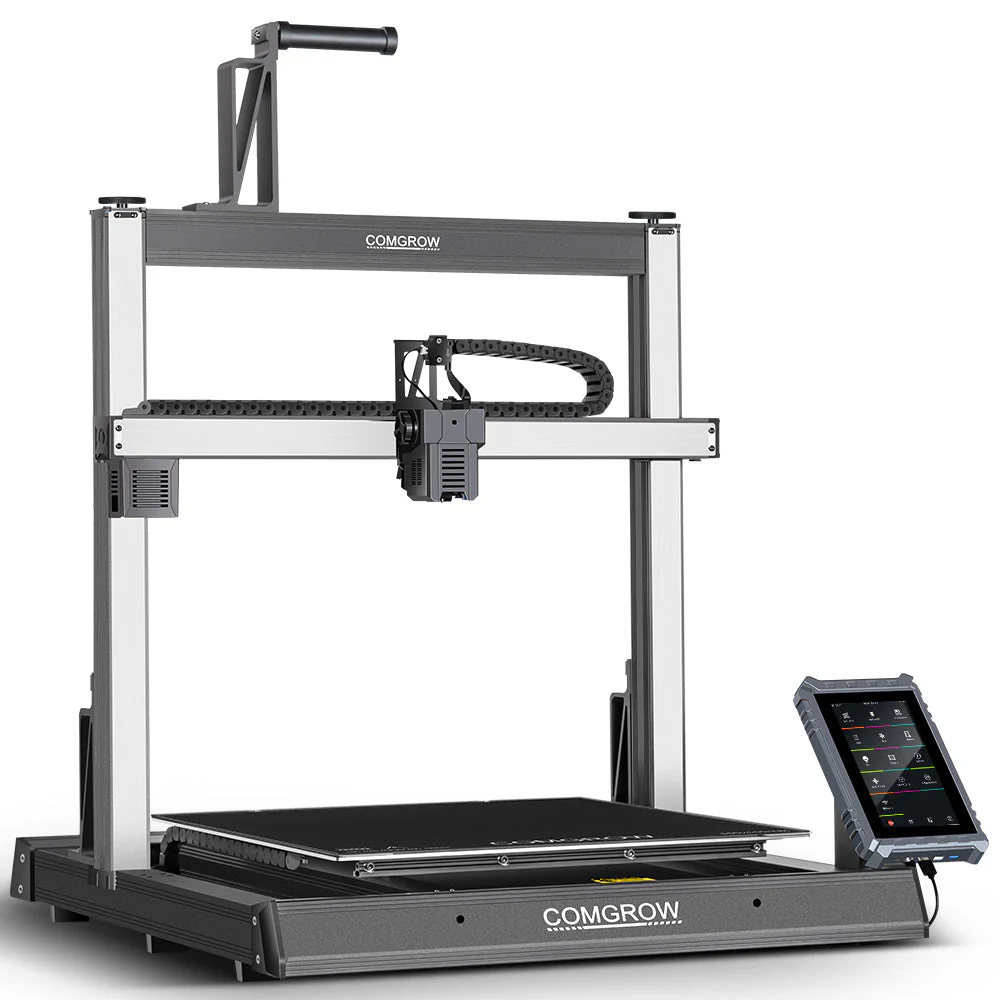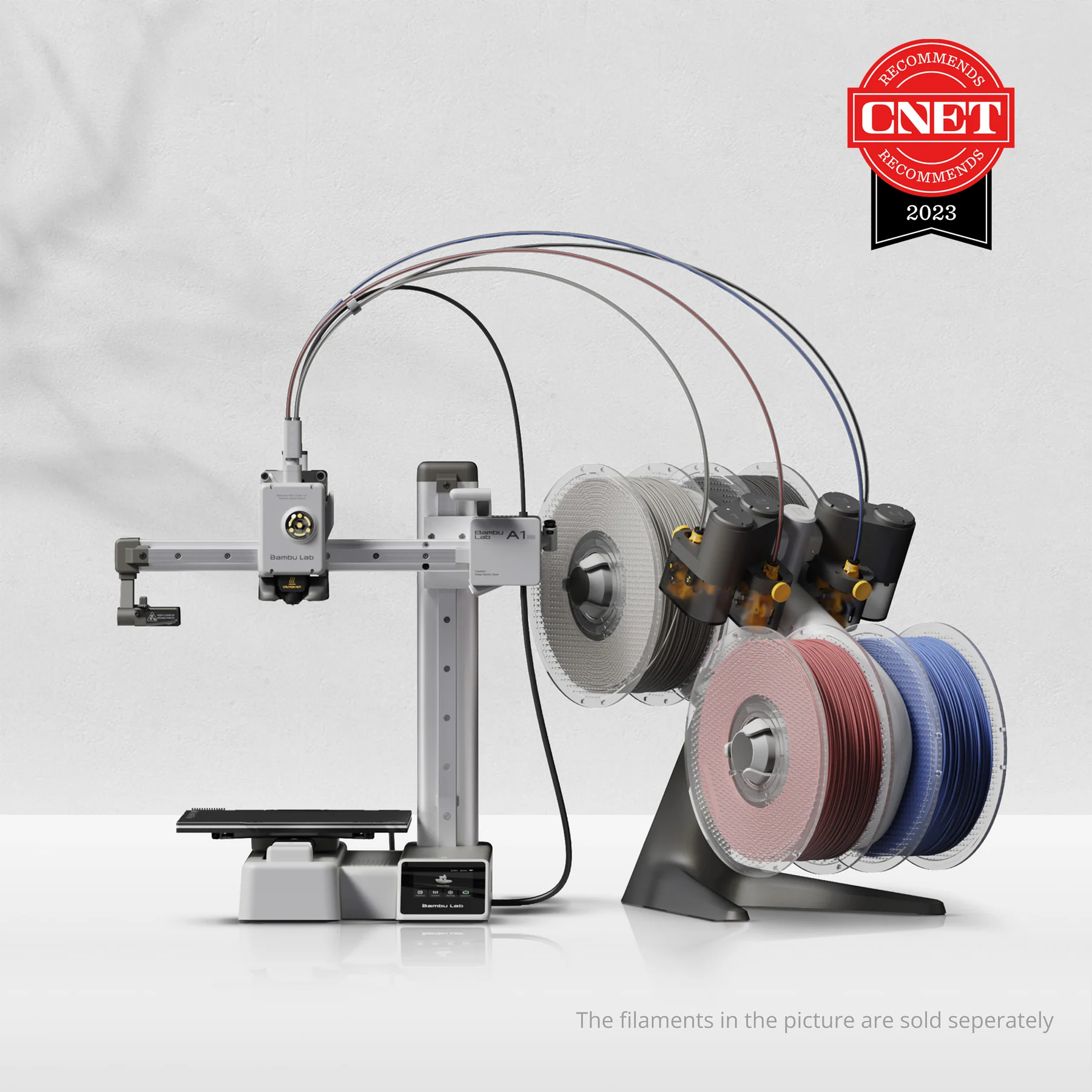Compare Comgrow T500 vs A1 Mini
Comparison between the best 3D printers
Choose the best 3D printer at the best price. The cheapest 3D printers are here.
Buy a 3D printer here with 3D Fila.
 |
 |
|
| Model | Comgrow T500 |
A1 Mini |
| Printing Material | Filament | Filament |
| Buy Filament for Sovol Comgrow T500 | Buy Filament forBambu Lab A1 Mini | |
| Estimated price | $799,00 | $549,00 |
| Manufacturer | Sovol | Bambu Lab |
| Release Year | 2024 | 2023 |
| Print Volume [mm] | 500x500x500 | 180x180x180 |
| Printer Size [mm] | 817x810x962 | 315x347x365 |
| Weight [kg] | 39 | 5,5 |
| Power Loss Recovery | YES | YES |
| Enclosed printer | NO | NO |
| Bed Leveling | Automatic | Automatic |
| Filament End Sensor | YES | YES |
| Bed type | Heated | Heated |
| Power supply system | Direct Drive | Direct Drive |
| Standard nozzle | 0,4 | 0,4 |
| Maximum Nozzle Temperature [°C] | 300 | 300 |
| Maximum Bed Temperature [°C] | 80 | 80 |
| Maximum printing speed [mm/s] | 500 | 500 |
| Filament holder | YES | YES |
| Camera for supervision | NO | NO |
| Recommended filaments | PLA, PETG, Fibra de Carbono, TPU | PLA, PETG, TPU, PVA |
| Recommended slicers | Creality Print, Cura 5.0 ou superior, Prusa Slicer, Orca | Bambu Studio, Super Slicer, Cura, Prusa Slicer, Orca |
| Maximum Resolution [mm] | 0,1 | 0,1 |
| Processor | 32-bit Silenciosa | |
| Display | 7'' IPS touchscreen, 60Hz | Touchscreen 2,4'' |
| Power Supply | 500 W | 150 W |
| Connectivity | Wifi, Bambu bus, Cartão SD | |
| Operating systems | Windows, Linux, Macbook | |
| Date of registration in the system | 2024-07-18 | 2024-04-10 |
| Release date | 2024 | 2023 |
| Extra features | The Sovol Comgrow T500 stands out for its large print volume of 500x500x500 mm, ideal for large-scale projects. It has a direct extruder with a gear ratio of 6.5:1, speeds of up to 200 mm/s, and high-performance motors. The 7" touchscreen with Klipper software makes navigation easy. The 49-point automatic leveling ensures a perfect first layer. It also has a full metal hotend at 300°C, linear rails on all axes, and WiFi connectivity. | The Bambu Lab A1 Mini stands out not only for its impressive speed and automatic calibration, but also for its multi-color printing capability thanks to AMS Lite. This innovative system makes multi-color printing easy, making it accessible to everyone. AMS Lite, specific to the A1 Mini, supports up to four different materials simultaneously, providing creative freedom without complications. With comprehensive sensors for energy monitoring and recovery, a camera for timelapses and Wi-Fi control, the A1 Mini and AMS Lite together offer an intuitive and advanced 3D printing experience, ideal for materials such as PLA, PETG and TPU, and designed for simplicity and fast maintenance with quick-change nozzles. |
| Support for multiple colors and materials (AMS and CFS) | NO | YES |
Notes * |
||
| Cost-benefit | 7 / 10 | 7 / 10 |
| Hardware | 3.6 / 10 | 4.8 / 10 |
| Tela | . | . |
| Print volume | 5 / 10 | 3 / 10 |
| Performance | 4 / 10 | 4 / 10 |
Conclusion |
| In comparing the Comgrow T500 and the Bambu Lab A1 Mini, several factors are vital to consider for potential buyers. First and foremost, the print volume of the Comgrow T500 is significantly larger, making it a more suitable option for those who need to produce large-scale prints. Its features, such as high-performance motors, the ability to handle various filaments, and a higher level of automation with a comprehensive leveling system, further contribute to its appeal for serious hobbyists and professionals. On the other hand, the Bambu Lab A1 Mini offers diverse capabilities in terms of material and color printing. Its AMS Lite system, which supports multi-color prints, provides an advantage for projects requiring creativity and variety, making it ideal for users who prioritize versatility in their printing endeavors. Additionally, the A1 Mini is notably more compact and lightweight, making it an excellent choice for users with limited space or who value portability. When considering cost, while the Comgrow T500 commands a higher price, its larger print capacity and robust features may justify the investment for users focused on larger projects. Conversely, the A1 Mini presents a more budget-friendly option without sacrificing speed or quality, catering to casual users and those who primarily engage in smaller projects. Ultimately, the choice between the two printers hinges on individual needs: the Comgrow T500 is better for those requiring larger print volumes and robust features for professional use, while the Bambu Lab A1 Mini suits users looking for versatility and a compact design for everyday printing. Thus, both printers offer distinct advantages that align with different user priorities, making either a solid choice depending on specific requirements. |

